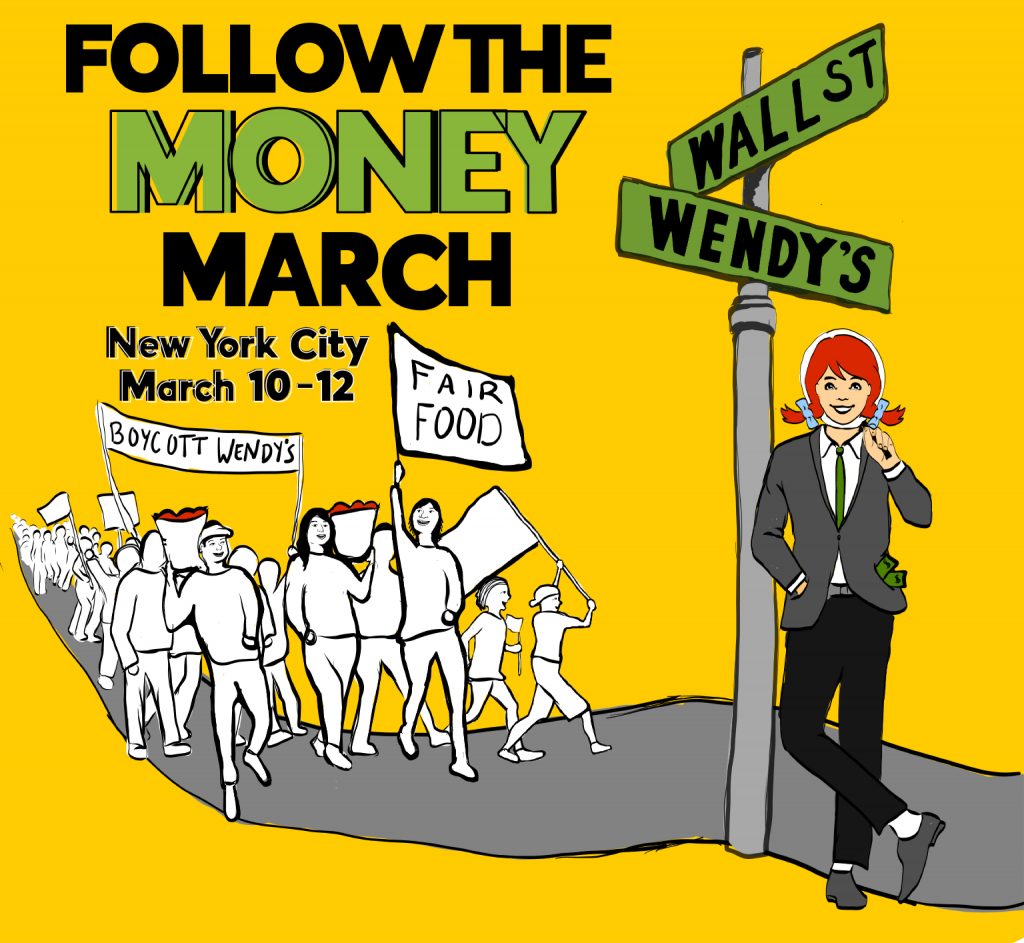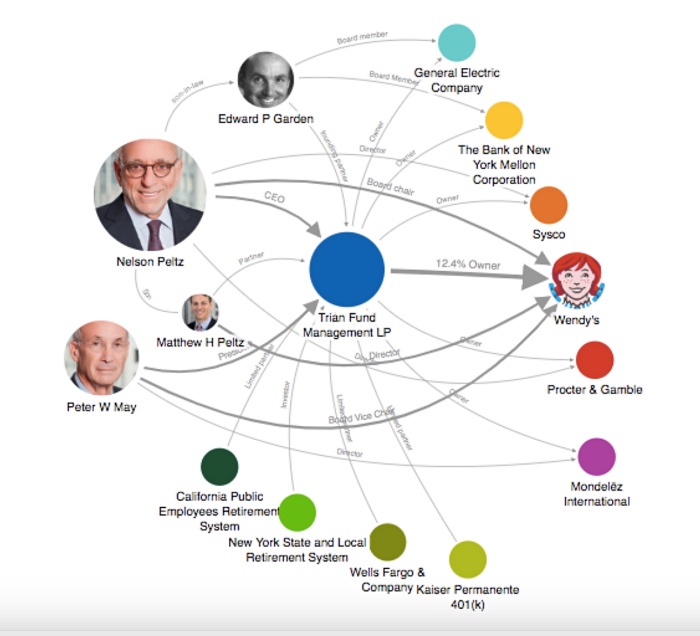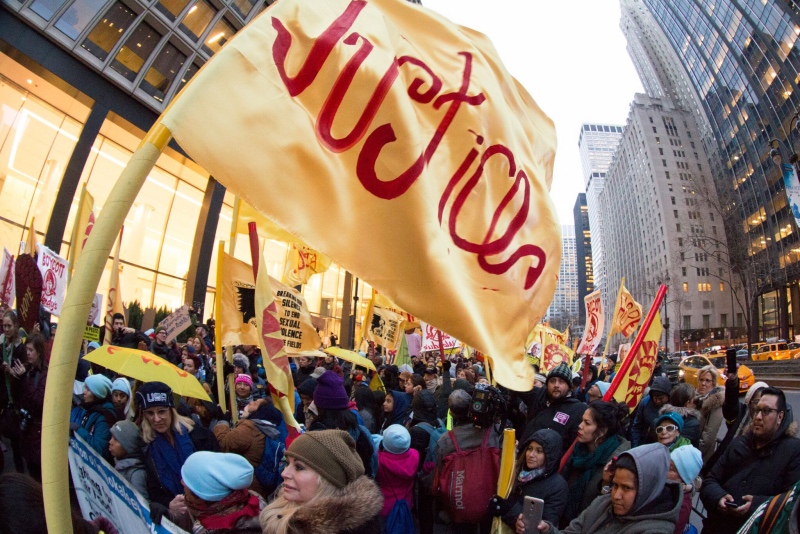
Demanding transparency and verifiable human rights protections in Wendy’s produce supply chain, farmworkers will march across New York City to hold major Wendy’s investors accountable for hamburger giant’s failure to join leading social responsibility program in US agriculture!
Make your plans TODAY to join CIW for the grand finale on Thursday, March 12 outside of the fast-food chain’s largest institutional shareholder, Trian Partners.
Get ready, Fair Food Nation: Farmworkers are taking the fight for Fair Food to Wendy’s most prominent Wall Street investors this spring!
Building on years of massive, colorful marches in New York City calling on Wendy’s leaders to bring the fast-food giant into the award-winning Fair Food Program, today we are announcing the details of our largest mobilization in the Wendy’s Boycott to date. From March 10-12, farmworkers from Immokalee, their families, and consumer allies will flood the Big Apple for the 3-day “Follow the Money” March through New York City’s bustling boroughs, carrying a resounding message for the wealthy decision-makers behind Wendy’s: You cannot hide from your responsibility to respect and protect the rights of farmworkers in Wendy’s supply chain!
The “Follow the Money” March will take the fight for farmworkers’ fundamental human rights directly to the doorstep of those with the power to ensure that the women and men picking Wendy’s produce can labor with dignity, safety, and respect on the job. Chief among them is billionaire investor and renowned activist shareholder Nelson Peltz. Mr. Peltz is Wendy’s Board Chair and CEO of the hedge fund Trian Partners, which owns over 12% of Wendy’s stock and employs several members of Wendy’s Board of Directors. For years, farmworkers and consumers have been demanding that Mr. Peltz use his influence as Chairman and major shareholder to help protect farmworkers against sexual assault, forced labor, and a host of other human rights abuses in the agricultural industry by urging the company to join the Presidential medal-winning Fair Food Program. Thousands have rallied at his office in Midtown Manhattan and in Palm Beach, Florida, where he owns a beachfront mansion worth over $123 million.
When it comes to determining the priorities that shape Wendy’s as a business, there is little room for doubt as to whose voices carry the most weight:

What’s at stake in the Follow the Money March?
Every day, millions of migrant farmworkers do the back-breaking work of harvesting the fruits and vegetables that feed the entire country, and generate billions of dollars in profits for the trillion-dollar retail food industry. Yet despite the essential nature of their work, farm labor remains one of the least-protected, lowest-paid jobs in the nation. Meanwhile, Wall Street investors doing business with companies like Wendy’s – which inexplicably refuses to partner with the only human rights program proven to prevent long-standing abuses in U.S. agriculture – make a fortune investing their money in an industry founded on unconscionable farmworker exploitation.
This analysis is brilliantly captured in the closing paragraph of an article by independent news blog Truthout published last April:
“The CIW’s effort to pressure Wendy’s to participate in the Fair Food Program is not just a battle between farmworkers and a major fast food chain. It is a battle that pits Florida’s tomato pickers against the Wall Street firm that oversees Wendy’s, which is run by a billionaire who has piles of cash to give to politicians… but who refuses to pay an extra penny per pound of tomatoes so that farm laborers can have better wages, safer working conditions, and more dignity at work.”
At the same time, the last few years have seen a marked change in the world of investors, as major players on Wall Street begin to wake up to consumers’ growing demand for true, verifiable responsibility when it comes to ensuring human rights through ethical business practices. In one of the most high-profile examples, BlackRock, the world’s largest asset management firm and Wendy’s third largest institutional shareholder, released a letter just last year stating the following:
“Unnerved by fundamental economic changes and the failure of government to provide lasting solutions, society is increasingly looking to companies, both public and private, to address pressing social and economic issues. These issues range from protecting the environment to retirement to gender and racial inequality, among others…. Stakeholders are pushing companies to wade into sensitive social and political issues… companies must demonstrate their commitment to the countries, regions, and communities where they operate, particularly on issues central to the world’s future prosperity…”
But those words aren’t worth the paper they’re written on unless they’re paired with action. The question now is whether these companies will move past public relations rhetoric and actually take meaningful steps to begin addressing how to combat issues like sexual violence or human trafficking. And there is no better first step for a company like BlackRock to take than partnering with a proven solution like the Fair Food Program, widely recognized as the single most effective social responsibility program in US agriculture.
And that brings us to what’s truly at stake in the fight to bring Wendy’s into the Fair Food Program: continuing to expand to thousands more workers the only antidote for the human rights crisis that has long plagued America’s fields.
The documented accounts of egregious human rights violations against farmworkers, both in the U.S. and abroad, are consistently making headlines. Here are just a few:
- “The rape crisis among California’s farm workers” – Capitol Weekly, 1/9/2020
- “Forgotten in the fields: Labor trafficking hides in plain sight across Texas, disproportionately affecting the thousands of farmworkers who visit the state on H-2A guest worker visas” – Texas Observer, 7/1/2019
- “EEOC: Dover farmworker sexually assaulted, retaliated against” – Teen Vogue, 5/9/19
Yet, Wendy’s has opted for social responsibility protections for the farmworkers who harvest tomatoes in its supply chain that are demonstrably inferior to those of all of its main competitors — companies like McDonald’s and Burger King that agreed to join the Fair Food Program years ago — professing blind faith, instead, in widely-discredited social auditing programs. Wendy’s even went as far as to shift its sourcing from its longtime partners in Florida to Mexico to get away from the Fair Food Program, leaving farmworkers in its supply chain vulnerable to the widespread sexual assault, violence, and systemic wage theft that has been documented to plague the produce industry there. Most recently, Wendy’s responded to consumer pressure by shifting away from Mexico’s field-grown tomato industry to greenhouse suppliers in the US, Canada, and Mexico, making claims that working conditions in greenhouse suppliers’ are inherently better than those in the fields – claims that strain credulity when held up against reports of harsh conditions faced by workers in greenhouses. And all the while, Wall Street investors continue to place their bets on Wendy’s ability to produce steady profits.
It’s time for Wendy’s to catch up to the rest of the fast-food industry in respecting and protecting farmworkers’ human rights — and we’re holding the Wall Street billionaires behind Wendy’s accountable until they do!
…So, we march!

Between last November’s powerful march on Trian Partners and the recently-filed New York City Council Resolution 1156 calling on Wendy’s to join the Fair Food Program, momentum is already building in the city and throughout the Northeast ahead of CIW’s return!
The “Follow the Money” March promises to become an unforgettable action in the history of the Campaign for Fair Food – but we can’t do it without you! We are calling on you, and every member of the Fair Food Nation, to join farmworkers in the fight for accountability, transparency and verifiable human rights protections as we march through New York’s storied streets and towering skyscrapers to the intersection of Wall Street and Wendy’s. We are calling for allies to join the CIW for the full three days of action, and most importantly, to join us at the culminating march on Thursday, March 12!
So, if you’re ready to march alongside farmworkers in New York City from March 10-12, sign up today! And check back again soon for more details on caravans from your city to the Big Apple, the march route and logistics, and other ways to support this year’s major spring action!
A team of farmworkers and ally organizers will be preparing for the march on the ground in New York City starting Feb. 1, so if you’re in New York and interested in hosting a presentation or workshop in your classroom, congregation, or community space with a leader of the CIW, reach out to organize@allianceforfairfood.org today.

